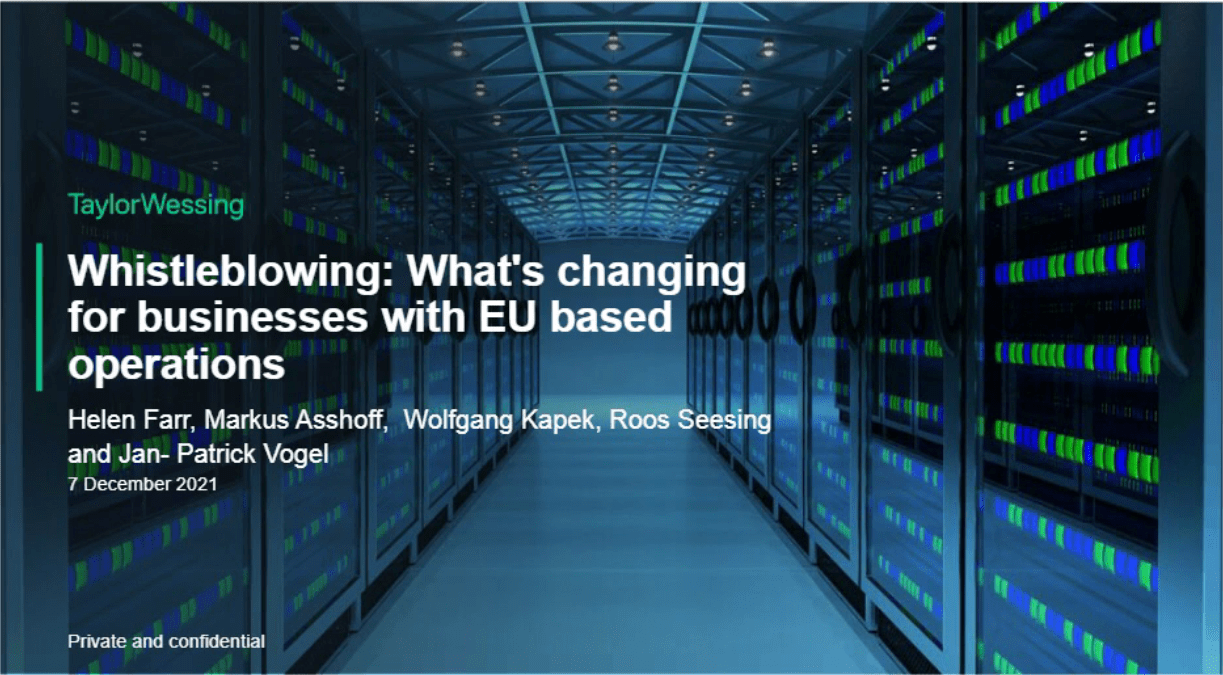- Home
- News & Insights
- Insights
- The EU Whistleblowin…
- Auf dieser Seite
On 7 December we held a webinar to answer your final questions before the EU Whistleblowing Directive (the Directive) comes into force.
Under the Directive, businesses and government bodies operating in any EU country must set up an internal whistleblowing system to give whistleblowers confidentiality and provide access to an independent investigation. They'll also need to maintain whistleblower confidentiality throughout investigations, keep them updated on progress and ensure there are no reprisals against those who come forward. Two implementation dates apply depending on workforce size:
- Businesses and government bodies with 250 or more workers must be compliant by 17 December 2021.
- Businesses and government bodies with between 50 and 249 workers have a further two years and must be compliant by 17 December 2023.
The Directive requires the above timings, but certain member states have already indicated that they'll delay implementation in their jurisdiction. Though it's currently unclear when we might see the final legislation, if you have 250 or more workers there are effectively just days left before the Directive is transposed into national law and applies to you.
Why is this important?
The EU is focusing on whistleblowing because it's incredibly important to revealing wrongdoing. It's decided there's a need for consistent, minimum standards for protection so there's nothing stopping people from coming forward.
Your questions answered
Our international panel were on hand for an interactive session answering your final questions and concerns around key issues for employers. The discussion centred around three areas:
- how you can prepare for changes
- how to protect your business
- how to respond to a complaint.
Some of the key topics that came up are listed below.
Don't be caught off guard
There's been a system to protect whistleblowers in place in the UK for over 20 years. But the Directive requirements will differ to what you're used to - don't underestimate the complexity of what you need to do to comply. If you have a presence in the UK and EU, it might be worth adopting the same system in your European operations as you do in the UK for simplicity.
Culture will be key
There can't be a culture of fear around whistleblowing. Workers can now make disclosures externally before doing so internally, opening your business up to exposure. But if you have the right system in place internally, people won't feel the need to go external. Education around whistleblowing needs to be led from the top, with training that whistleblowing is for the protection of the company and workers and not a bad thing.
Prepare for an investigation before it happens
You should be confident you can handle a complaint before you even receive one. It's much better to discover something doesn't work in your system in the preparation stage. Walk through your process including roles and responsibilities to make sure it works and confidentiality can be maintained, especially in smaller businesses.
This could get complicated
We've been asked where businesses have operations in multiple countries across Europe whether they need to set up a whistleblowing system for each country, or if they can set up a central system which applies everywhere. In principle the EU Commission has discussed this with member states and doesn't want a group resolution for businesses with more than 250 workers. You might be forced to set up different systems for different countries, which could get complicated fast. Again, preparedness will be on your side.
How we can help
Our international whistleblowing service can help you ensure compliance and protect your business. Our presence in the UK and across the EU means we can smooth out some of the issues that come with addressing the Directive in multiple countries. We can also manage your internal reporting channel for you, reinforcing your independence. For more information, click here.
Related Insights

The relevance of the EU Whistleblowing Directive to UK businesses
von mehreren Autoren

Return to work: key issues for life sciences
von Helen Farr und Adrian Toutoungi

Working alongside COVID-19: What data protection challenges do employers face?
von Helen Farr und Sally Annereau








